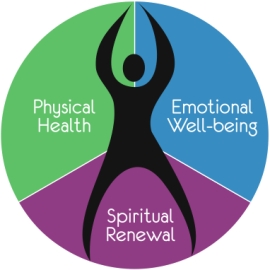In modern medicine, most of us have experienced conventional medical treatment: you go to a physician, and the physician asks you about your symptoms, maybe checking your temperature, blood pressure, weight, and perhaps reflexes and other things. Then the doctor diagnoses the problem based on the information he or she has obtained, and recommends a treatment or procedure, perhaps accompanying that with a prescription of some sort. And there’s nothing wrong with any of that.
Normally the conventional medical doctor looks strictly at things going on in your body, because those are the things that are most easily observed and measured. It is relatively easy, for example, to measure how much you weigh, your body temperature, or your blood pressure. Those are numbers, and can be compared to norms for your  age, sex, and so forth.
age, sex, and so forth.
But modern medicine is rediscovering what the ancients knew for centuries: the condition and health of the body are affected by the mental and spiritual state of the person. The word “holistic” (sometimes spelled as “wholistic”) comes from the concept of treating the whole person: body, mind, and spirit.
We know, for example, how our emotions can affect our bodies. Think about how someone may feel when about to take an important step in their life: a final exam for graduation, propose to their intended spouse, or go into battle for the first time. The body produces adrenaline. The pulse races; the breathing may become rapid. Of course, these particular situations are temporary, but it’s undeniable that they occur, and in some situations (a stressful job, being a long-term caregiver, PTSD, etc.) they can continue for months or years.
The spiritual side of things cannot be ignored, either. Time after time, research and study have shown that people with vital spiritual lives generally have less depression, lower blood pressure, and tend to live longer, more productive lives. This doesn’t mean that everyone who attends their church or synagogue will live a long, healthy life–being religious doesn’t equate with being spiritual. But it does indicate that having a healthy attitude toward God and inner spirituality, can aid in having a happier and longer lifespan.
So, holistic health practice aims at helping each individual not only by looking at the physical aspects of health, but by broadening the focus to include mental attitudes and spirituality. And in this case, spirituality is not about looking outside ourselves as much as seeking a connection with God, within ourselves.
Holistic health practice also means looking outside conventional medical treatment (allopathic medicine), for things that will aid conventional medicine to do its job better and more quickly. For this reason, holistic health practice is sometimes called integrative health practice, because it dovetails with conventional medicine, rather than trying to replace it. No responsible holistic health practitioner (HHP) will tell you to abandon your regular physician or ignore his/her advice.
All holistic health practitioners do not attempt to work in every area of holistic health—most will focus on one or two areas, just as physicians do not try to learn every specialty of medical practice. Some HHPs may concentrate on naturopathy; others may concentrate on spiritual counseling, energy work, or acupressure. But all are aware that tunnel vision (seeing only one narrow part of the whole) keeps the practitioner from seeing other important clues about the health of the client.
Some links:
Spirituality and Health – Baylor University Medical Center
Spirituality and Health – University of Maryland Medical Center
Religion, Spirituality, and Health – Oregon State University
Link Between Emotions and Physical Health – Psychologies magazine
